![]()
![]()
| Tennis |
| Basketball |
| Volleyball |
| Soccer |
| Table Tennis |
| Skiing |
| Badminton |
| Baseball |

| Higher Educasion | ||||
| A | Z | L | Total | |
| University | 2 | 2 | 1 | 5 |
| Junior College | 0 | 0 | 2 | 2 |
| Technical College | 15 | 15 | 11 | 41 |
| subtotal | 17 | 17 | 14 | 48 |
| Employment@Area | ||||
| A | Z | L | Total | |
| Tajima | 13 | 8 | 10 | 31 |
| Hyogo@PrefD | 0 | 4 | 1 | 5 |
| Other@PrefD | 3 | 1 | 4 | 8 |
| Other | 0 | 3 | 3 | 6 |
| subtotal | 16 | 16 | 18 | 50 |
| Total | 33 | 33 | 32 | 98 |
| A : Agriculture Z : Livestock L : Life Science | ||||

| Vegetables |
| Fruits |
| Flower/Plants |
| Mushrooms |
| Produce |
| Japanese Black Cattle |
| Fattening Cattle |
| Hog Raising |
| Poultry |
| Food |
| Clothing |
| Agriculture & Food |
| Floristy |
| Photography |
| Broadcasting |
| Tea Ceremony |
| Flower Arrangement |
| Volunteering |
| Tajima Studies |
| Art |
| Principal | 1 |
| Vice Principal | 1 |
| Tenured Teacher | 21 |
| Teacher | 5 |
| Nurse | 1 |
| Practical Teacher | 6 |
| Practical Assistant | 6 |
| Reappointed Teacher | 3 |
| Office Chief | 1 |
| Clerical Staff | 3 |
| School Janitor | 2 |
| ALT | 1 |
| Technical Expert | 3 |
| Part-time Club Adviser | 2 |
| School Doctor | 3 |
| School Dentist | 1 |
| School Pharmacist | 1 |
| Part-Time Teacher | 6 |
| Curriculum |
| Number of Faculty and Staff |
| Club Activities |
| Number of Students and their |
| After Graduation |
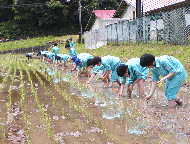 |
 g |
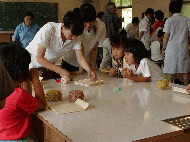 |
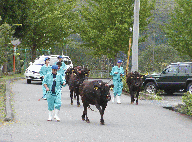 |
| 300|1@sa x|CxshiCgCi@667|0043 sdk@iOVXjUUQ|UPOV/e`w@iOVXjUUQ|UPOW |
|
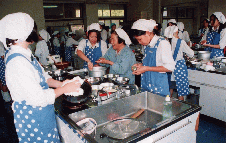
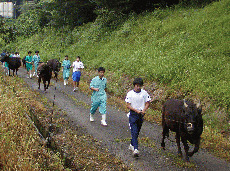
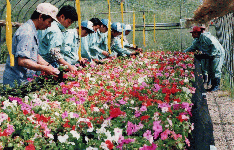
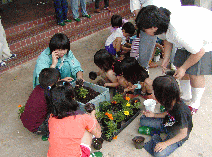
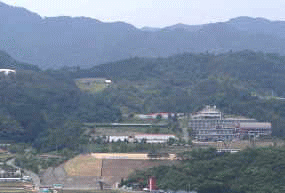
Tajima
Agricultural High School, affectionately known in the community as Tanno, was
founded in 1976, nestled on the hill of Togayama in Yoka-cho. The school was originally
formed as a joint venture between Yoka High School and Toyo-oka Argricultural
High School.
It is a 3-year coeducational senior high school with approximately 300
students aged between 15-18 years old. It has the unique distinction of
being the only agricultural high school in the Tajima region of northern
Hyogo Prefecture, and one of the only senior high schools in Hyogo Prefecture
with an agricultural curriculum. Students elect to concentrate in one of
three courses: agriculture, livestock, or life science.
Back
1) We are never reluctant
to work our hardest.
2) We have an utmost respect for life.
3) We aim higher and higher to be
better and better each day.
Back
One of the central tenets of Tanno is that
through agricultural education, it is possible
for each student to fully develop his true
personality and abilities. Faculty members
endeavor to encourage students' own self-realization
as well as to foster the development of upstanding
citizens who not only contribute to the advancement
of the community but also function as contributing
members of the local community and greater
society. Additionally, students are expected
to
1) be energetic, passionate, and creative 2) develop sound faith in and principles toward life and
humanity 3) harness the skills,
knowledge and ability needed to effectively manage farms and promote modern
agriculture in Japan.
Back
![]()
To promote a desire for life-long learning, students are challenged to
acquire essential and indispensable knowledge and skills, and to develop
the positive attitude fundamental for life-long learning. Students
are challenged to cultivate their hearts and minds in order to be a vital part
of society. Students are also
encouraged to deepen their personal ethical values and canons, including
self-control and sympathy to others. Through a broad range of hands-on
experience and activities, the faculty work to nurture amongst the students the
willingness to learn, the ability to think critically, the capacity for self-expression , and the
desire to express personal creativity. In
this environment, students are educated according
to their aptitudes and not just their abilities.
The school aims to foster among the students:
a solid educational foundation and essential skills and habits for daily life;
a positive attitude toward lifelong learning through hands-on experience;
an interest in understanding and respecting different cultures through international activities and exchanges;
an utmost respect for both life and human rights in order to be a part of a 'cooperative society'
To achieve these aims, students are offered extensive career guidance, and active agricultural education.
In order to create a school of distinction, the faculty collaborates extensively
with parents and families,
the community, and other organizations. Teachers also participate in comprehensive
in-job training and
continuing education to improve their teaching styles and methods.
Back
![]()
![]()
The Agriculture course is designed to provide an opportunity for students
to learn
the methods and techniques needed to raise the plants and vegetables best
suited to
the needs and environmental characteristics of the Tajima region.
Agriculture students raise a diverse range
of crops including horticuitural products
(small plants and flowers), mushrooms, vegetables, rice, and fruits. In this course students
also examine new techniques in cooperative ventures with local farmers
and organizations
as well as learn how to function as a future farmer with a career in agribusiness.
![]()
The focus of the Livestock Course is to assist students in learning the most modern methods
and techniques necessary to raise and manage industrial livestock, as well
as train future
generations of livestock farmers. The Livestock Course has four main divisions:
cows, pigs,
broiler chickens and laying chickens. Students devote extensive time to studying the regionfs
famous Tajima Beef Cows, and promoting the schoolfs own private label
chickens,
Tan-no Dori, which are healthier
and tastier than usual broiler chickens.
The school maintains approximately 30 breeding beef cows, 20 fattening
cows, about 120
laying hens, and 10 breeding sows. About 24,000 broiler chickens and 200 pigs are
produced annually. It is the expressed desire that students will one day be the leaders
in the local farming industry through the effective application of the
knowledge of the latest
technology learned at Tanno.
![]()
The Life Science course concentrates on empowering young people to understand,
through
both hands-on experience and practice, both community life and the agriculture
of our region.
The course also serves to reinforce a desire among youth to contribute positively to the
development and improvement of the modern society. In this course students
deepen their
understanding of domestic management in areas such as culinary skills,
food processing,
apparel production, gardening, and child development and care. They cooperate extensively
with the agricultural and livestock students by working collaboratively
together with varying
crops and livestock.
Back
| 3rd grade | A | Z | L | U |
| l @Japanese | 2 | 2 | ||
| World History | 2 | |||
| Physical Education | 3 | |||
| Agricultural Machinery | 3 | |||
| Politics and Economics | ||||
| Agricultural Information Processing | ||||
| Mathematics TEU | 3 | |||
| Agricultural Machinery | 3 | |||
| Politics and Economics | ||||
| Agricultural Management | ||||
| Writing | ||||
| English@U | 3 | |||
| Biology I | 2 | |||
| Japanese History@A | ||||
| Agricultural Information Processing | ||||
| Japanese Expression | ||||
| Clothing Production | ||||
| Japanese Expression | 2 | |||
| Japanese Expression | 2 | |||
| Practical Mathematics | ||||
| Japanese Culture | ||||
| Agricultural Management | ||||
| General Household Sciences | ||||
| Biology@U | 2 | |||
| Vegetables /Flowers | 4 | |||
| Fruits / Applied Micro-organisms | 2 | |||
| Animal Husbandry | 4 | |||
| Animal Biotechnology / Food Processing | 2 | |||
| Child Rearing | 2 | |||
| Food Production | 2 | |||
| Green Life@ | 2 | |||
| Project Study | 3 | |||
| Comprehensive Practice | 2 | |||
| Home Room | 1 | |||
| Comprehensive Practice (Extra) | 2 | |||
| 2nd grade | A | Z | L | U |
| Modern Japanese | 2 | 2 | ||
| Modern Society | 2 | |||
| Agricultural Machinery | 2 | |||
| Culinary Arts@ | 2 | |||
| Tajima's Agriculture@ | 2 | |||
| Mathematics A/II | 4 | |||
| Biology I | 3 | 3 | ||
| Physical Education | 2 | |||
| Health | 1 | |||
| Oral Communication T@ | 2 | |||
| Agricultural Accounting | 3 | |||
| English II | 3 | |||
| Home Economics | 2 | |||
| Clothing Production | 2 | |||
| Plant Biotechnology | 2 | |||
| Foundations of Agricultural Science | 2 | |||
| Food Design | 2 | |||
| Vegetables | 2 | |||
| Fruits@/@Flowers | 2 | |||
| Animal Husbandry | 4 | |||
| Agriculture & Food /Floristy | 2 | |||
| Livestock | 2 | |||
| Comprehensive Practice | 2 | |||
| Home Room | 1 | |||
| Comprehensive Practice (Extra) | 2 | |||
| 1st grade | A | Z | L | U |
| Japanese | 4 | |||
| Geography A | 2 | |||
| Mathematics I | 3 | 3 | ||
| Science A | 2 | |||
| Physical Education | 2 | |||
| Health | 1 | |||
| Art (Music/Calligraphy) | 2 | |||
| English I | 3 | 3 | ||
| Environmental Science | 2 | |||
| Produce | 2 | |||
| Agricultural Information Processing | 2 | |||
| Foundations of Agricultural Science | 2 | |||
| Cattle Raising | 2 | |||
| Poultry | 2 | |||
| Home Economics | 4 | |||
| Comprehensive Practice | 2 | |||
| Home Room | 1 | |||
| Comprehensive Practice (Extra) | 2 | |||